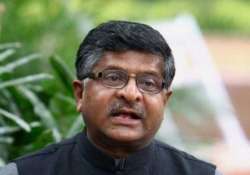Customers should have unrestricted access to all lawful content on Internet, says Ravi Shankar Prasad
Committing himself to keep the Internet equally accessible to all users, Telecom and IT Minister Ravi Shankar Prasad yesterday said blocking and deliberate slowing down or speeding up of lawful content on the web should

Committing himself to keep the Internet equally accessible to all users, Telecom and IT Minister Ravi Shankar Prasad yesterday said blocking and deliberate slowing down or speeding up of lawful content on the web should not be allowed.
With over a million Internet users opposing TRAI's consultation paper on allowing telecom companies like Airtel, Vodafone and Reliance to charge consumers differently for using different websites and mobile applications, he said the government had powers to give directions to the regulator on public policy.
"Government agrees with the viewpoint that blocking and deliberate slowing down/speeding up of lawful content on Internet should not be allowed and customers should have unrestricted access to all lawful content on Internet,” he said replying to a call attention notice on net neutality in Rajya Sabha.
He, however, said the implications of net neutrality would need detailed expert examination with regard to traffic management, national security, integrity of network and investment in infrastructure. ”This is what governments and regulators all over the world are grappling with,” he said.
Prasad said as per the Telecom Regulatory Authority of India (TRAI) Act, TRAI makes recommendations to Government on regulating various aspects of telecom sector. TRAI's powers to regulate tariff and quality of service are subject to overall public policy of government and “the government has sufficient powers under the TRAI Act to invoke its national policy objectives to give directions to TRAI,” he said.
Since TRAI issued the consultation paper on March 27, there has been a viral crusade by campaigners for net neutrality – the principle that all traffic on the Internet should be treated equally. Telecom companies that support the TRAI paper argue that new data-intensive applications, or so-called Over-the-top services like Facebook, Twitter, Instagram, Skype and Viber, require more and better infrastructure but don't pay for it.
They argue they are spending money developing infrastructure, on which those services are piggybacking. Opponents say differential pricing undermines net neutrality, a principle some countries, including the US, endorse. ”Government stands for ensuring non discriminatory access to internet for all citizens of the country and current debate on net neutrality should be seen from this perspective while resolving the issues harmoniously and consistent with constitutional and economic principles,” Prasad said.
The Minister said a committee constituted with the mandate to recommend overall policy and technical responses to net neutrality is expected to summit its report by month end.